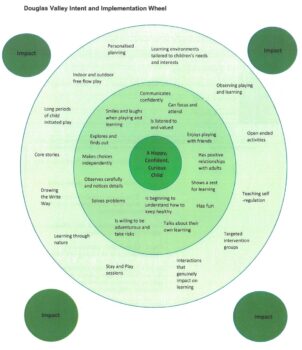Implementation
Our curriculum has been designed to:
- Start with the child, recognising their uniqueness and individuality;
- Be underpinned by the characteristics of effective learning, to enable children to develop the skills and attitudes to become confident, capable and self-motivated lifelong learners
- Develop and enhance curiosity, critical thinking skills and metacognition
- Prioritise children’s physical and emotional wellbeing, including recognising and celebrating their achievements, their dispositions to learn, their social development and relationships
- Provide balance and depth across the seven areas of learning working towards the Early Learning Goals
How we plan for our children
Our curriculum implementation is underpinned by a belief that young children’s learning is holistic and is delivered through a mix of high quality continuous provision, which is enhanced to support children’s individual learning needs and adult focus activities. We use a personalised planning approach, which responds to children’s individual interests and learning needs. We believe that the majority of children’s learning can arise when they are following their interests and being supported by ‘tuned in’ sensitive adults who model, encourage and support each child’s next steps in learning. .Open ended learning experiences are provided to enable children to follow their own interests and ideas, as our action research has indicated that where children have opportunities to access open ended activities they are more likely to be engaged in and motivated by learning.
At Douglas Valley our 3 and 4 year olds engage in two objective based grouptime sessions a day, these are planned to meet the needs of the children in each group. Children in both Pre school and Under 3s access free flow indoor and outdoor play.
How we assess children’s learning and progress
The new Early Years Foundation Stage Statutory Framework (September 2021) emphasises a reduction in workload, critiquing recent practice as being data obsessed and treating the Development Matters non statutory guidance as a checklist for children’s development, which was never its intention. The emphasis is now on observing how each child learns, how staff facilitate learning and how staff show children have made progress.
Based on this, we have changed how we document children’s learning, by introducing an approach called OPAL (Observation of Play and Learning). As OPAL is centred around the unique child, it works alongside out personalised planning approach perfectly.
Our implementation strategies
- Indoor and Outdoor free flow play
- Learning through nature
- Interactions between adults and children that genuinely impact on learning, focus on thinking together, develop vocabulary and promote awe and wonder.
- Personalised approach to planning
- Observing Playing and Learning (OPAL)
- Learning environments tailored to children’s needs and interests
- Long periods of child initiated play
- Teaching self regulation
- Open ended activities
- Core stories
- Drawing the Write Way – targeted teaching of visual motor integration
- Targeted language, wellbeing and sensory processing groups
- Stay and Play sessions for parents


